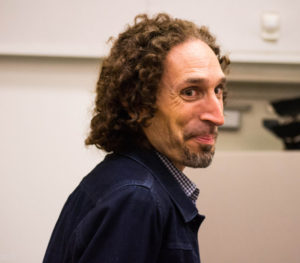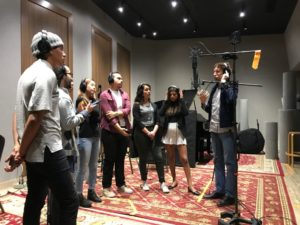
Photo: Mackenzie Karbon
On February 10, 2019, John Daversa’s CD, American Dreamers: Voices of Hope, Music of Freedom, won three Grammy Awards: Best Arrangement, Instrumental or A Cappella – “Stars and Stripes Forever”; Best Improvised Jazz Solo – “Don’t Fence Me In”; and Best Large Jazz Ensemble Album. Our congratulations to John Daversa, and to the DACA student musicians who contributed to the CD. Just a few weeks before the Grammy Awards, Elmore Magazine was pleased to offer our readers this interview.
American Dreamers, an inspiring contemporary big band CD with three Grammy nominations, teams jazz professionals with student musicians who are DACA recipients (Deferred Action for Childhood Early Arrivals). After DACA was rescinded in 2017, John Daversa, a veteran jazz artist, arranger, conductor and educator with several previous Grammy nominations, conceived American Dreamers. He felt a deep desire to give a voice to children who arrived here as undocumented immigrants. Elmore staffer Annie Dinerman spoke with him about the people and the project.
Annie Dinerman for Elmore: There are roughly 800,000 DACA recipients; 90 percent are employed or in school. As Chair of the Studio Music and Jazz Department at University of Miami’s Frost School, what percentage of your students are DACA recipients?
John Daversa: I am not usually aware if they are DACA. At the session in Los Angeles, I had a former student of mine (from California State University, Northridge) show up. I realized he was a DACA recipient. The main tracks were recorded in Miami.
AD/EM: Are there professional musicians in your Big Band who are immigrants or first generation Americans?
JD: Yes! Tal Cohen, a brilliant pianist from Israel/Australia is a recipient of the “Genius” Visa. Trumpeter Jean Caze is first generation Haitian. David Leon (bari sax) and Jesus Mato (lead trumpet) I believe are first generation Cuban-Americans.
AD/EM: What jazz artists have inspired you with their political music?

Photo: Mackenzie Karbon
JD: Jazz can be an agent for social change, from the role that it played in the civil rights movement—and well before—to serving as a compass for the current direction of our country. Sidney Bechet and Louis Armstrong, for example, you can “feel” how important the music is for them, no matter how oppressive the challenges. It has tremendous purpose. I hear that purpose in all the jazz masters that have come after: Billie Holiday, Billy Strayhorn, Max Roach, Miles Davis, Dizzy Gillespie, John Coltrane, Charlie Haden, Wayne Shorter, Herbie Hancock, Terri Lyne Carrington, on and on.
AD/EM: How did you recruit the Dreamers?
JD: I had engagements booked across the country where I was already performing. We reached out to organizations, Facebook groups, word of mouth. For most of their lives, they have felt misunderstood and unsupported. This gesture of the Grammy nomination gave them a feeling of being supported. No one but a Dreamer knows the challenges they face on a daily basis, just because they were brought to this country as children—no fault of their own. They grew up here, went to school here, and contribute to society here. I hope that we as Americans will take care of our own.







Be the first to comment!